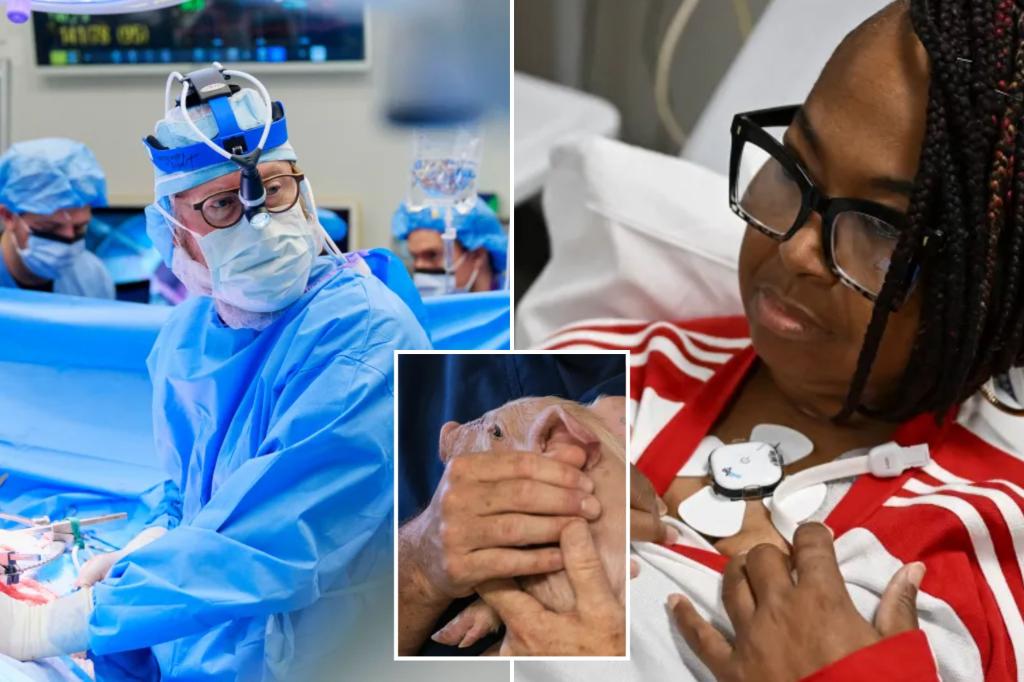Towana Looney, a 53-year-old woman from Gadsden, Alabama, has achieved a remarkable medical milestone, becoming the longest-living recipient of a pig kidney transplant. Sixty-one days after the groundbreaking surgery, she remains healthy and energetic, exceeding the survival rates of previous recipients of genetically modified pig organs. Her remarkable recovery offers a beacon of hope for the future of xenotransplantation, the transplantation of animal organs into humans, a field striving to address the critical shortage of human organs for transplantation. Looney’s vibrant health and positive outlook underscore the potential of this experimental procedure to transform lives.
Looney’s journey to this medical marvel began with a selfless act of donating a kidney to her mother in 1999. Years later, pregnancy complications led to high blood pressure, ultimately damaging her remaining kidney. Despite eight years of dialysis, her body developed extremely high levels of antibodies, making her ineligible for a traditional human kidney transplant. These antibodies were primed to attack any foreign human organ, a condition known as “highly sensitized.” Facing a bleak prognosis, Looney bravely enrolled in the experimental pig kidney transplant program at NYU Langone Health, led by Dr. Robert Montgomery.
The procedure, performed on November 25, 2024, was a resounding success. Looney was discharged a mere 11 days later and has continued to thrive under the close monitoring of Dr. Montgomery’s team. Regular blood tests and other assessments tracked her progress, allowing doctors to detect and successfully treat subtle signs of rejection approximately three weeks post-transplant. This early intervention, informed by previous research on pig kidney transplants, proved crucial in preventing further complications and ensuring the continued function of the organ. Looney’s case stands in stark contrast to prior pig organ transplant recipients, none of whom survived beyond two months.
Looney’s remarkable recovery is not only a personal triumph but also a significant advancement for the field of xenotransplantation. Her case represents a crucial step towards addressing the dire shortage of transplantable human organs. Currently, over 100,000 people in the U.S. are on the transplant waiting list, with thousands dying each year before receiving a life-saving organ. Pig organs, genetically modified to be more compatible with the human immune system, offer a potential solution to this critical need. Looney’s success demonstrates the viability of this approach and fuels optimism for future research and clinical trials.
The information gleaned from Looney’s case is invaluable to the scientific community. Her comparatively healthier pre-transplant condition, compared to previous recipients, provides a richer dataset for understanding the long-term effects of pig organ transplantation. Dr. Tatsuo Kawai of Massachusetts General Hospital, a leader in xenotransplantation research, emphasizes the importance of collaborative learning within the field. Each successful transplant, especially Looney’s extended survival, contributes vital knowledge that will shape the design and execution of future xenotransplantation trials. This collaborative spirit is essential for accelerating progress and bringing this life-saving technology to a wider population.
Beyond her contribution to medical science, Looney has embraced the role of an advocate and ambassador for xenotransplantation. Through social media, she connects with individuals facing similar struggles on the transplant waiting list, offering support and sharing her personal experience. She provides a real-life example of the potential of pig organ transplants, offering hope to those who may be considering this experimental option. Her willingness to share her story and answer questions reflects her compassionate nature and desire to help others navigate the complex and often daunting landscape of organ transplantation.
While the long-term success of Looney’s transplant remains unknown, her current health and resilience are cause for celebration. She continues to be closely monitored by the medical team, who are prepared to address any future challenges. Her case signifies a major leap forward in xenotransplantation, offering tangible hope for countless individuals awaiting life-saving transplants. Looney’s journey embodies the spirit of scientific innovation and the power of human resilience, paving the way for a future where animal organs can bridge the gap and offer a second chance at life.








